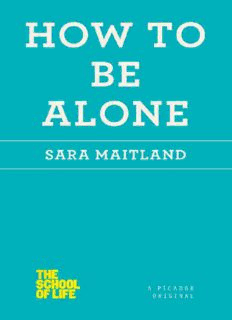Table Of ContentIN THIS AGE OF CONSTANT CONNECTIVITY, LEARN HOW TO ENJOY
SOLITUDE AND FIND HAPPINESS WITHOUT OTHERS.
OUR FAST-PACED SOCIETY does not approve of solitude; being alone is
antisocial and some even find it sinister. Why is this so when autonomy,
personal freedom, and individualism are more highly prized than ever
before? Sara Maitland answers this question by exploring changing
attitudes throughout history. Offering experiments and strategies for
overturning our fear of solitude, she helps us practice it without anxiety
and encourages us to see the benefits of spending time by ourselves. By
indulging in the experience of being alone, we can be inspired to find
our own rewards and ultimately lead more enriched, fuller lives.
Also by Sara Maitland
From the Forest: A Search for the Hidden Roots of Our Fairy Tales
A Book of Silence
HOW TO BE ALONE
Sara Maitland
PICADOR
New York
The author and publisher have provided this e-book to you for your
personal use only. You may not make this e-book publicly available in
any way. Copyright infringement is against the law. If you believe
the copy of this e-book you are reading infringes on the author’s
copyright, please notify the publisher at:
http://us.macmillanusa.com/piracy.
Contents
Also by Sara Maitland
I. Introduction
II. Being Alone in the Twenty-first Century
1. Sad, Mad and Bad
2. How We Got Here
III. Rebalancing Attitudes to Solitude
1. Face the Fear
2. Do Something Enjoyable Alone
3. Explore Reverie
4. Look at Nature
5. Learn Something by Heart
6. Going Solo
7. Train the Children
8. Respect Difference
IV. The Joys of Solitude
1. Consciousness of the Self
2. Attunement to Nature
3. Relationship with the Transcendent
4. Creativity
5. Freedom
V. Conclusion
Homework
About the Author
Photographic Credits
More from the School of Life Library
I. Introduction
You have just started to read a book that claims, at least, to tell you how
to be alone.
Why?
It is extremely easy to be alone; you do not need a book. Here are
some suggestions:
Go into the bathroom; lock the door, take a shower. You are alone.
Get in your car and drive somewhere (or walk, jog, bicycle, even
swim). You are alone.
Wake yourself in the middle of the night (you are of course completely
and absolutely alone while you are asleep, even if you share your bed
with someone else, but you are almost certainly not conscious of it, so
let’s ignore that one for the moment); don’t turn your lights on; just sit
in the dark. You are alone.
Now push it a bit. Think about doing something that you normally do
in company – go to the cinema or a restaurant, take a walk in the
country or even a holiday abroad – by yourself. Plan it out; the logistics
are not difficult. You know how to do these things. You would be alone.
So what is the problem? Why are you reading this book?
And of course I do not know the answer. Not in your case, at least. But
I can imagine some possible motives:
For some reason, good or bad, of which bereavement is perhaps the
bitterest, your normal circle of not-aloneness has been broken up; you
have to tackle unexpected isolation, you doubt your resources and are
courageously trying to explore possible options. You will be a member of
a fast-growing group – single-occupancy households in the UK have
increased from 12 per cent of all households in 1961 to nearly 30 per
cent in 2011.
Someone you thought you knew well has opted for more solitude –
they have gone off alone to do something that excludes you, temporarily
or for a longer period; you cannot really feel jealous, because it excludes
everyone else too; you are a little worried about them; you cannot
comprehend why they would do anything so weird or how they will
manage. You want to understand.
You want to get something done – something that feels important to
you. It is quite likely, in this case, that it is something creative. But you
find it difficult to concentrate; constant interruptions, the demands of
others, your own busy-ness and sociability, endless connections and
contacts and conversations make it impossible to focus. You realize that
you will not be able to pay proper attention unless you find some
solitude, but you are not sure how this might work out for you.
You want to get something done – something that feels important to
you and of its very nature has to be done alone (single-handed sailing,
solo mountaineering and becoming a hermit are three common
examples, but there are others). The solitude is secondary to you, but
necessary, so you are looking for a briefing. This group is quite small, I
think; most of the people who seriously want to do these sorts of things
tend to be experienced and comfortable with a degree of aloneness
before they become committed to their project.
You have come to the disagreeable awareness that you do not much
like the people you are spending time with; yet you sense that you are
somehow addicted to them, that it will be impossible to change; that any
relationship, however impoverished, unsatisfying, lacking in value and
meaning, is better than no relationship; is better than being alone. But
you aren’t sure. You are worried by the very negative responses you get
whenever you bring the subject up.
You are experiencing a growing ecological passion and love of nature.
You want to get out there, and increasingly you want to get out there on
Description:IN THIS AGE OF CONSTANT CONNECTIVITY, LEARN HOW TO ENJOY SOLITUDE AND FIND HAPPINESS WITHOUT OTHERS.Our fast-paced society does not approve of solitude; being alone is antisocial and some even find it sinister. Why is this so when autonomy, personal freedom, and individualism are more highly prized

